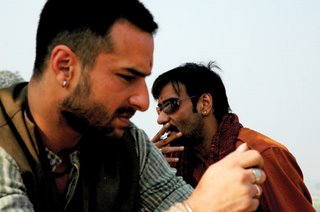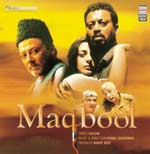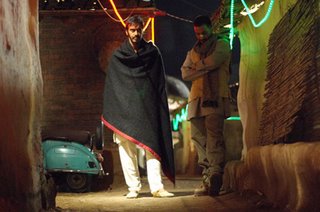
Again the team of Gulzar and Vishal Bharadwaj huddle up and produce a masterpiece of sorts. Let's see how many times they've teamed up: 1) Jungle Book (Gulzar: Lyrics; Vishal: Music), 2)Maachis (Gulzar: Direction, Lyrics; Vishal: Music), 3)Makdi (Gulzar: Lyrics; Vishal: Direction, Music), 4)Maqbool (Gulzar: Lyrics; Vishal: Direction, Music), 5)Ishqa-Ishqa (Music Album), (Gulzar: Lyrics; Vishal: Music), 6)Omkara (Gulzar: Lyrics; Vishal: Direction, Music). This is all I recall I mean. There must be more to it. There's got to be more to it.
This is the second part in a trilogy of Shakesperean Tragedies that Vishal is adapting to fit in the Indian context. The third installment of the trilogy will take some time make, he says.
Anybody who has seen Maqbool will realise that it is nearly an unsurmountable task to make a better movie than that. And whoever has seen Omkara will realise that Vishal comes dangerously close to that. Very dangerously close. This post will have a separate section which will compare Maqbool with Omkara because the key to understanding the Director's approach in the latter lies in the former.
First Half of the Movie
The opening of the movie is one of the most brilliant openings you'll see in Hindi cinema. The opening scene shows Saif (more about him in later sections) and the newcomer Himanshu (I think this was the name, but if I am wrong, apologies) and the gun Saif wields throughout the movie (effectively I mean). With the characteristic bawdy rustic Bhojpuri/Hindi/Haryanvi language showcased in this movie, he explains why the marriage procession will not proceed. The movie then goes on to push the viewer into the plunge that the characters take themselves.
The first half is a kind of introduction to the characters and the rural settings that the movie exploits. The recreation of the settings of Uttar Pradesh are brilliantly authentic to say the least. The walk, the talk, posture, the ambience is beautifully rendered in the movie, maybe because Vishal has added personal touches here and there of his own experiences of UP. The movie is wonderfully supported by the cast of actors about whom a lot will be said later.
The bawdy language, the caste politics, the marriage processions, the 'item numbers' etc all of them are deeply rooted in the traditional context that the film manipulates. It is an adaptation in a true sense because only the central idea of Othello is taken-that of slow poisoning due to jealousy-and it is interpreted in a completely indigenous rural Indian context. The fact of Othello being a Moor in Venice is reflected in Omkara being a half Brahmin in a Brahmin dominated factional UP political/underworld scenario. The isomorphism is complete.
The Second Half of the Movie
The key to the second half lies in having seen the second half of Maqbool. One cannot but experience the second half to be exactly, and I mean exactly the same as that of Maqbool. The stylistic techniques (the slow darkening of a scene on a crucial point and then its opening in an indolent way someplace else), the narrative style, the climax-you name it and the chances are that they are the same as those in Maqbool. Some people might call it self plagiarism but I would rather think that it was Vishal's idea of taking his previous movie Maqbool to a larger audience in a more commercial form. However, the influences must be dealt with separately.
Maqbool and Omkara

The name Maqbool is the name of the protagonist in the movie, much in the same way it is in the play by Shakespeare. Similarly the name Omkara is the name of the hero the way it is in the play. Both are tragedies and are supposed to be followed by another Shakespearean tragedy that will form the trilogy that Vishal has wanted to direct since long. Although the star cast of Maqbool is one of the greatest of all times-just have a look: Pankaj Kapur, Om Puri, Naseeruddin Shah, Irfan Khan, Tabu etc, the best possible star line from the commercial world is lined up in Omkara. Ajay Devgan, Naseeruddin Shah, Saif Ali Khan (he has become 'What a man' finally in this movie. He was giving indications of this metamorphosis for a long time), Konkana Sen Sharma, 'Viveik' Oberoi (witness the Ekta Kapoor phenomenon), Kareena Kapoor and Himanshu (what a brilliant debut!).
The stylistic techniques that the director employs in Maqbool can be seen pervading the entire space of Omkara too. The language becomes even coarser, though, in the latter movie, keeping with the spirits of the loactions of rural eastern UP that Vishal focusses on. I know that this sort of language is pretty authentically recreated in the movie because I hail from those regions and have had personally seen such apparently 'uncivlised' language used in day to day conversations by both men and women with a matter of factness that is hard to believe until you've seen it for yourself. The previous movie was set in Mumbai underworld while this one goes into the Hindi heartlands. This can be taken to be another proof of the versatility of the director. Telling stories in a similar fashion in different settings is the hallmark of a truly great artiste and Vishal is proving again and again that he belongs to the 'great' and not just the 'good' or 'very good'.
There is one jarring note in this beautiful melody though. Though the setting is east UP, the language used by everyone has major Hariyanvi influences. This is not true if you actually visit these places in East UP but I think because hardcore Bhojpuri would have been incomprehensible to most audiences, the director took this route to make the language understandable to a larger number of people.

The next section will try to analyse the performance of some of the actors in the movie:
Ajay Devgan:
He has proved himself again and again. And he does this once more. Remarkably restrained and intense at the same time, he is Omkara, the great and the gullible. Brilliant, just like himself.
Saif Ali Khan:
Well, initially to be short, I had planned to write just about him in this blog and through him comment generally about the merit of the movie. So incredible he is in the movie! This however comes as no surprise to me personally at least. He has been showing wonderful promise ever since Dil Chahta Hai and this was but expected sometime or the other.
Saif conjures up images of suave metrosexuality and 'heart-throb ness'. He is the eligible bachelor that everybody thought was good in mushy, romantic comedies etc-in a word movies that I generally hate (unless they are immaculate sublimities like As Good as it Gets). But the yellow toothed, foul mouthed, rustic henchman that grows and colours his little finger red is the farthest from what Saif reminds one of. I personally believe that this role is going down in Indian cinema as one of the best ever. It will rank with roles Bhikhu Mhatre's portrayal by Manoj Bajpai in Satya and Sadashiv Amrapurkar in Ardhsatya. Bravo Saif! You have become 'What a Man'.

Naseeruddin Shah:
I will not insult the reader's intelligence by commenting anything about Naseer. He is firmly established in my personal pantheon and even if he fucks something up (can he really ever fuck anything up? I don't think so), I am so biased in his favour that I will find something great in that too.
"Viveik" Oberoi
If people think Ekta Kapoor has something in her numerological fundas, they might just have something to cheer about. Because Mr 'Viveik' does not fuck this one up. Infact he is what he's supposed to be in this movie:Kesu. Not bad at all. Much better than his previous performances, I'd say.
But just what happened to him. The Chandu of Company definitely has lost his way. He drifted off to 'Home Delivery' and 'Kyun Ho Gaya Na?' and other stuff I don't want to recall. But I sure am glad that he seems to be coming back in form.
Konkana Sen Sharma
Wonderfully rustic-and very east UP type rustic, something that wouldn't have been easy at all. She gives a couple of brilliant scenes especially towards the end when she finally quietens Iago. Brilliantly original! Wah ustad wah!
Kareena Kapoor
She doesn't fuck it up. Maybe because she doesn't get a chance to. But if this is the general trend and not just an odd exception, in her filmography, I am ready to forgive her for things like 'Kabhi Khushi Kabhi Ghum', where acting is something that she even isn't supposed to do.
Bipasha Basu
Not bad at all.
Himanshu
If I am getting his name right (I think I am), then this guy has given a brilliant debut. He is as pathetic as he is supposed to be. Thin, awkward and pathetically funny and unfortunate at the same time, the ostensibly servile yet vengeful lover, Himanshu is able to translate all complex emotions his character feels onto the celluloid wonderfully well. Brilliant!
On a parting note, I must say that I did not expect the censor board of India to have acted as maturely as they did. Congratulations! We finally saw an uncensored, uncut bawdy and ribaldry filled tragedy of epic proportions.
